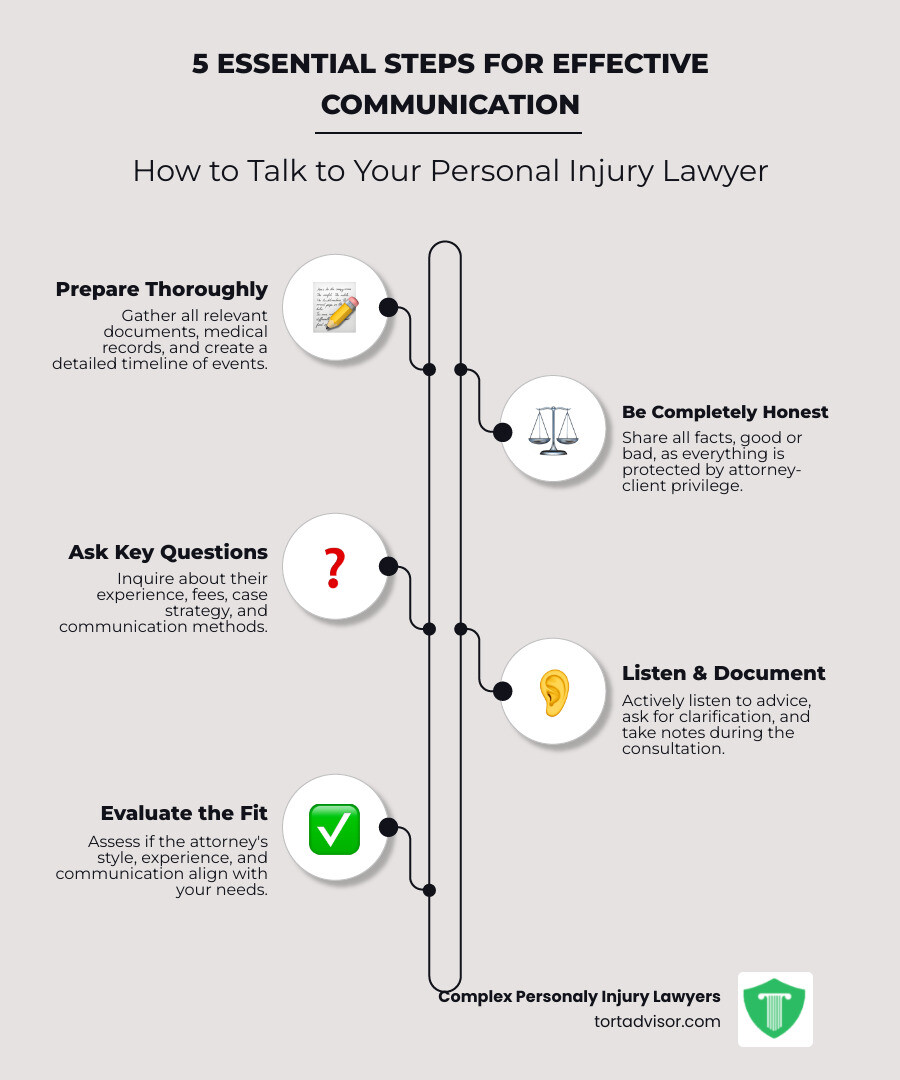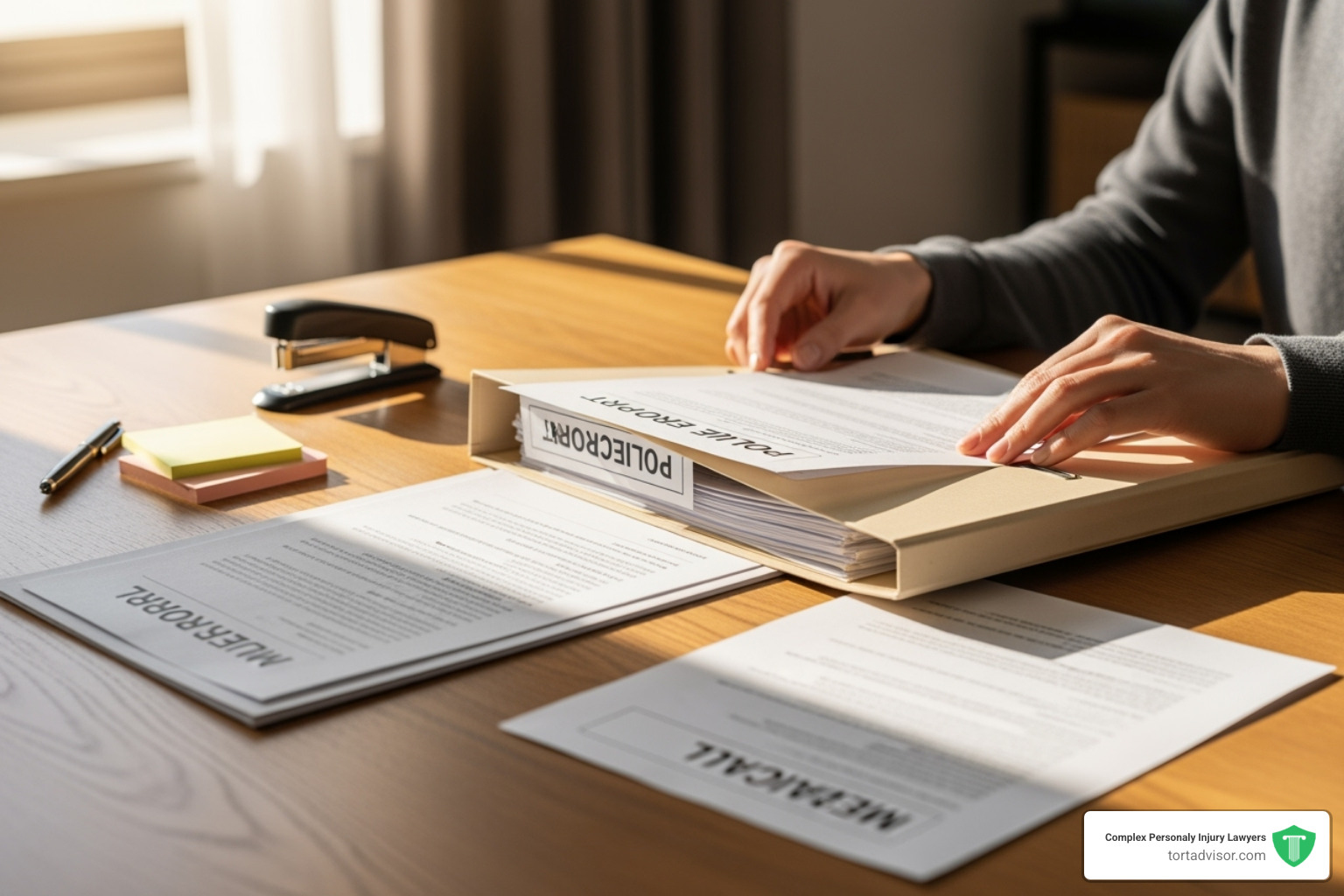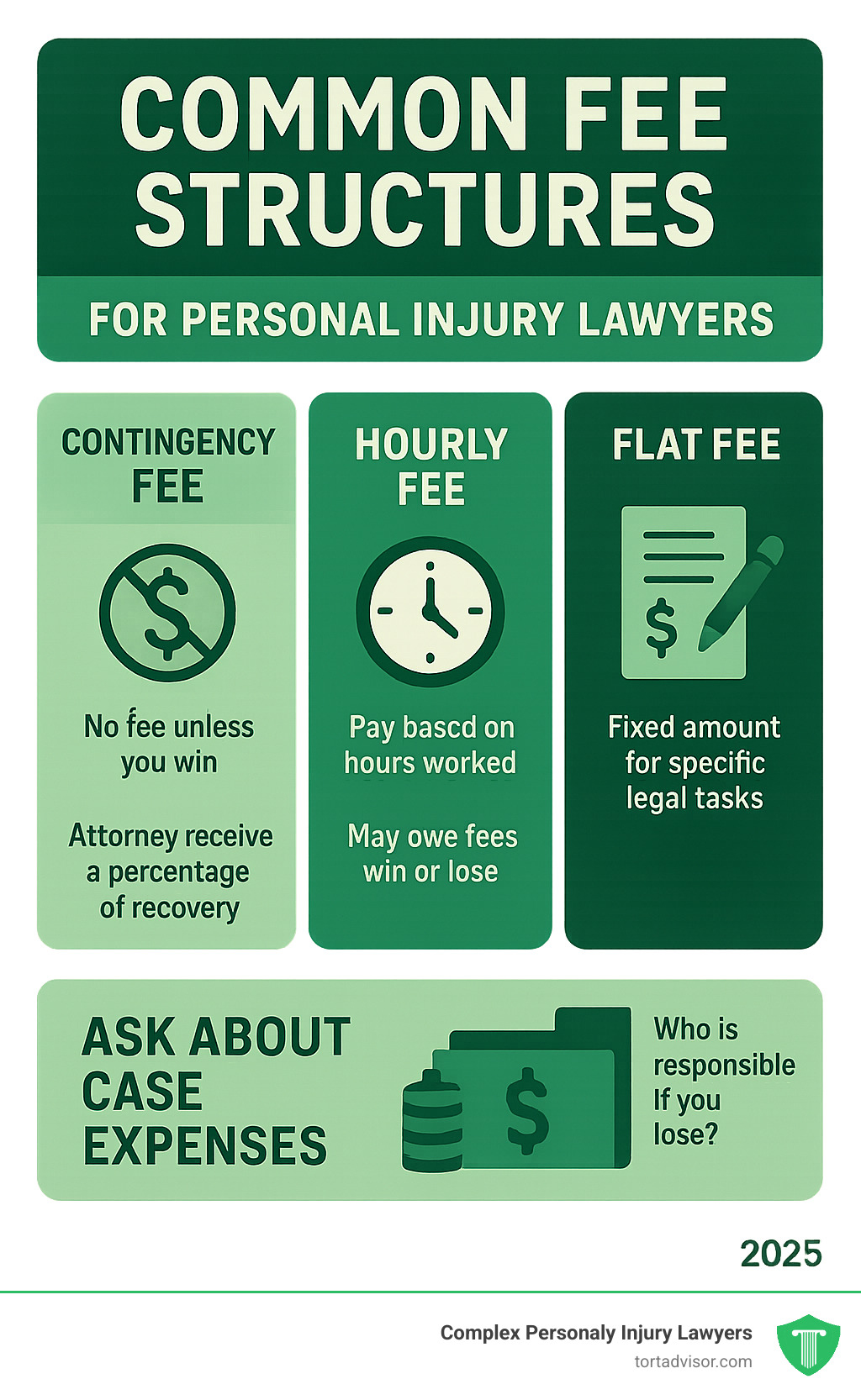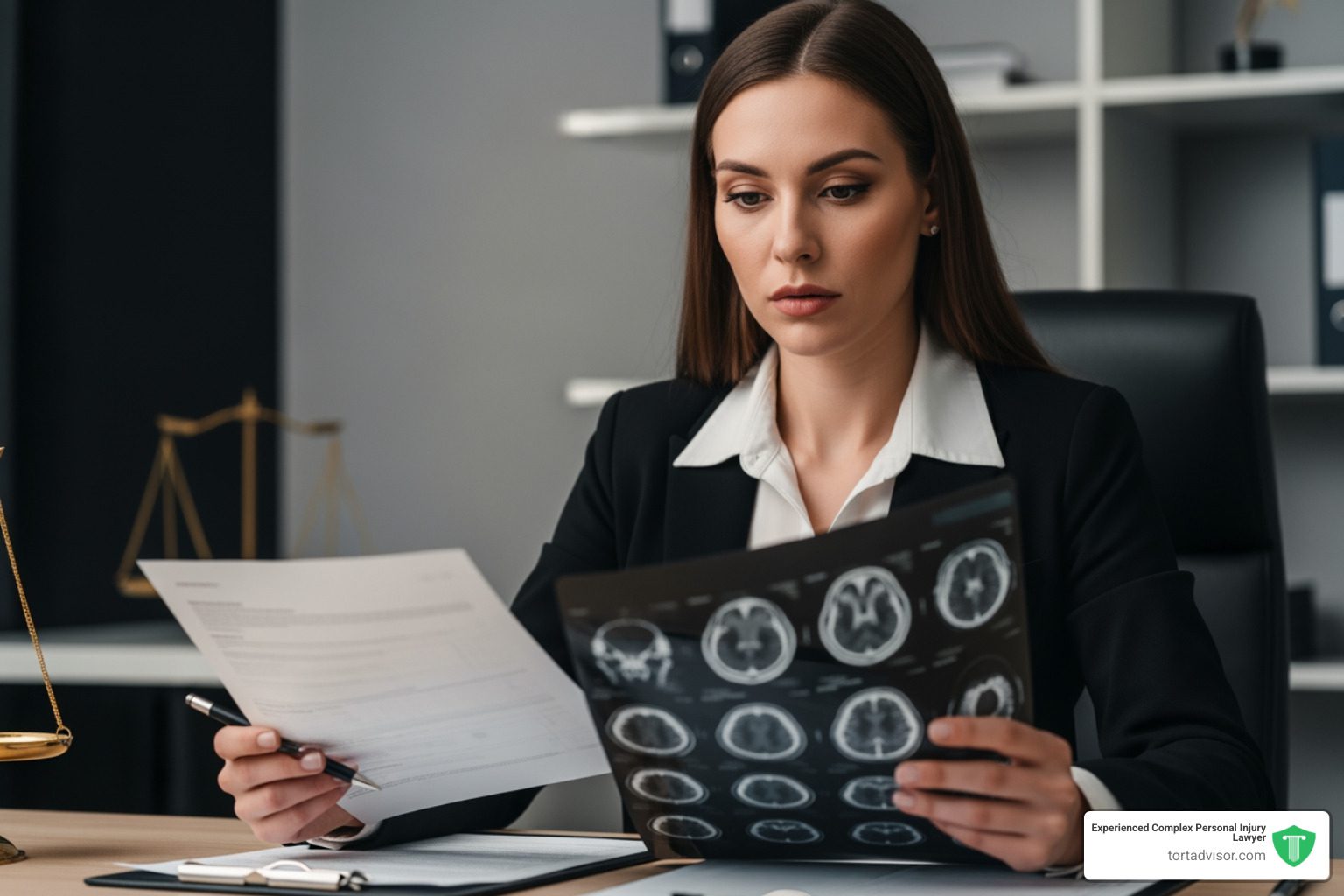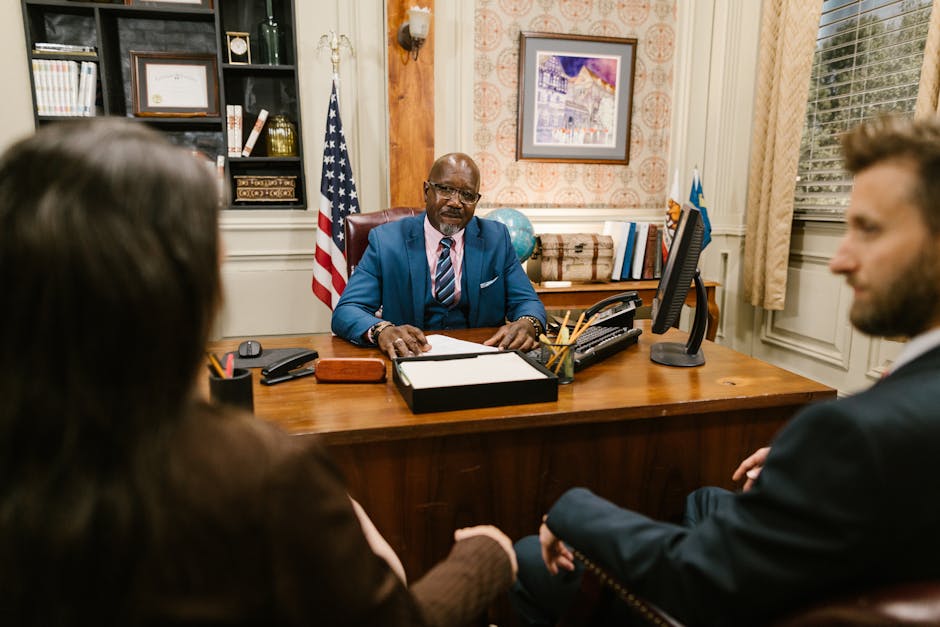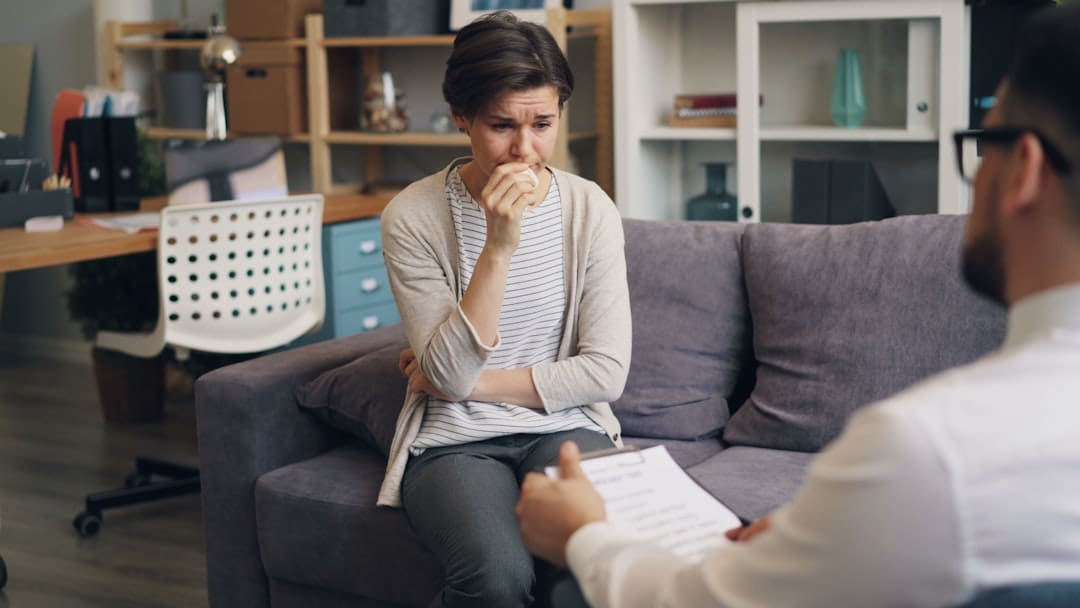


Why Effective Communication With Your Lawyer Matters
Knowing how to talk to personal injury lawyer effectively is the foundation of a successful case. When you’re dealing with injuries and mounting bills, clear communication with your attorney is essential to prevent confusion or misunderstandings.
Quick Guide – How to Talk to Your Personal Injury Lawyer:
- Be completely honest – Share all facts, even those that seem harmful to your case.
- Come prepared – Bring medical records, police reports, photos, and insurance correspondence.
- Ask direct questions – Inquire about their experience, fees, timeline, and case strategy.
- Stay calm and factual – Stick to the facts rather than emotional reactions.
- Take notes – Document important points and next steps during meetings.
- Communicate your preferences – Tell them how often you want updates and your preferred contact methods.
Most personal injury attorneys offer free consultations that typically last 15-60 minutes. During this meeting, they’ll evaluate your case while you assess if they’re the right fit for you.
Attorneys often work on a contingency fee basis (usually 25-40% of your settlement), meaning you pay nothing upfront and only pay if you win. This aligns their interests with yours, motivating them to get you the best possible outcome.
Approach your consultation as a two-way interview. You’re not just seeking legal help; you’re choosing an advocate who will fight for your rights and guide you through a complex process.
My background is in helping people understand complex systems. I know how crucial clear communication is when dealing with personal injury cases and finding the right legal representation.
Relevant articles related to how to talk to personal injury lawyer:
- do i need a personal injury lawyer
- how do i find a good personal injury lawyer
- how much does a personal injury lawyer cost
Before the Consultation: Setting the Stage for Success
Your first meeting with a personal injury attorney is a two-way interview. They evaluate your case, and you decide if they are the right advocate for you. Preparation is the key to a productive conversation. Being well-prepared allows your attorney to quickly grasp your case’s scope, provide accurate advice, and help you make an informed decision.
What to Bring to Your First Meeting
Gathering a comprehensive file of documents is vital. This preparation helps your attorney understand the full, accurate story of your case.
- Police or incident reports provide the official account of what happened, including parties involved, witness statements, and any citations.
- Medical records and bills are crucial. Bring everything related to your injuries, including ER visits, therapy notes, and prescriptions. These documents quantify the financial impact and help prove the full extent of your damages.
- Photos and videos of the accident scene, property damage, or your injuries can be powerful evidence, often capturing details that written reports miss.
- Insurance company correspondence, including letters, emails, or notes from calls with adjusters, shows what has been communicated so far.
- Pay stubs or income documentation help establish lost wages and earning capacity if your injury caused you to miss work.
- A written timeline of events helps organize your thoughts and ensures you don’t forget important details during the discussion.
If you’re unsure whether you need a personal injury lawyer, review our guide: Do I Need a Personal Injury Lawyer?
What Information to Be Prepared to Share
Beyond paperwork, your personal story is vital. Your attorney needs to hear your experience in your own words, with as much factual detail as possible. Everything you share is protected by attorney-client privilege, meaning your lawyer cannot disclose what you tell them. This confidentiality allows you to be completely honest.
Be ready to share:
- A detailed narrative of the incident. Don’t leave anything out, even details that seem minor.
- A description of your injuries and treatment, including how they affect your daily life. This includes physical limitations, emotional distress, and lost hobbies. These “noneconomic damages” are often significant components of a settlement.
- Information on any previous injuries or pre-existing conditions. Your attorney needs your complete medical history to anticipate arguments from the opposing side.
- An honest account of your role in the incident. If you did anything that might have contributed, share it. This gives your attorney the complete picture to assess your case’s strengths and weaknesses accurately.
Be honest and transparent—your attorney is there to help, and your credibility plays a key role in their decision to take your case.
How to Prepare for a Phone Consultation
Phone consultations can be as effective as in-person meetings if you prepare. Create a professional and focused environment for the call.
- Find a quiet, private space to protect your confidentiality and ensure you can both focus.
- Have your documents scanned or easily accessible on your computer.
- Use a reliable phone or computer with a strong connection.
- Keep note-taking materials ready to jot down key takeaways and questions.
- Minimize distractions by turning off notifications and letting others know you are on an important call.
- Be prepared to provide details about your injuries, medical providers, time missed from work, and wages. The more organized you are, the more effectively the attorney can evaluate your case.
The Initial Consultation: How to Talk to a Personal Injury Lawyer and Get Answers
The initial consultation is your chance to tell your story, get professional insight, and decide if the lawyer is the right fit. Most consultations are free and last 15-60 minutes, depending on your case’s complexity. During this meeting, both you and the attorney are determining if you’re a good match. They evaluate if they can win your case, while you decide if you can trust them with your future.
Learning how to talk to a personal injury lawyer effectively during this consultation can make all the difference. Be prepared, stay focused on facts, and ask the right questions.
Key Questions to Ask Your Potential Attorney
This is your time to interview them. Good attorneys expect and welcome thorough questions. You are potentially entering a partnership that could last for months or years.
| Question | Why It Matters |
|---|---|
| What is your experience with cases like mine? | Ensures the attorney is familiar with your type of case |
| What percentage of your caseload is personal injury? | Shows their focus and expertise |
| What is your record with settlements and trials? | Helps you understand their approach and success rate |
| Who will handle my case day-to-day? | Clarifies who your main contact will be |
| How often and by what methods will you communicate with me? | Sets expectations for updates and accessibility |
| What are the strengths and weaknesses of my case? | Provides a realistic outlook |
| What is the estimated value of my case? | Helps you understand potential outcomes |
| Do you have any relevant awards or certifications? | Demonstrates credibility and recognition |
Ask for an honest assessment of your case’s strengths and weaknesses. A good attorney will point out potential challenges and explain how they plan to address them. If someone guarantees a win or promises a specific dollar amount, that is a red flag.
Understanding Legal Fees and Costs
Most personal injury lawyers work on a contingency fee basis, meaning you pay nothing upfront. They only get paid if you win your case, which aligns their interests with yours. The typical contingency fee ranges from 25% to 40% of your settlement or award.
It’s also important to discuss case expenses, which can include court filing fees, expert witness fees, and medical record retrieval costs. You need to clarify who pays for these costs and when they are deducted. Some firms take costs “off the top” before calculating their fee, while others deduct costs after. This can significantly impact your final net recovery. Also, ask what happens to these costs if you don’t win. Some attorneys absorb these costs, while others may expect you to pay them back. Understand this before signing any agreement.
For more details, see: How Much Does a Personal Injury Lawyer Cost?
Tips for How to Talk to a Personal Injury Lawyer Effectively
- Listen actively and ask for clarification. If a lawyer uses legal jargon you don’t understand, ask for a plain English explanation. A good attorney will be happy to clarify.
- Don’t be intimidated. You are the expert on your own life and injuries. Your questions are important, and you have a right to feel comfortable and informed.
- Stay calm and stick to the facts. While your injury is traumatic, focus on conveying clear, factual information during the consultation. Your attorney needs facts to build a strong case.
- Take notes. You’ll receive a lot of information, so jot down key points, next steps, and answers to your questions. This shows you’re engaged and serious.
- Be completely honest. Don’t hide details that might seem harmful. Your attorney needs to know everything to prevent surprises that could damage your case. Everything you tell them is protected by attorney-client privilege.
Evaluating the Attorney: Is This the Right Fit for You?
After the consultation, you must choose the right attorney. This decision is about more than credentials; it’s about finding an advocate who understands your situation and will fight for you. You need an expert who communicates clearly and inspires confidence. Trust your instincts. Did you feel heard during the consultation? Did the attorney seem genuinely interested in your case? Your gut feeling often picks up on important cues.
How to Assess if a Personal Injury Lawyer is the Right Fit
When evaluating an attorney, ask yourself these questions about your consultation experience:
- Do you feel comfortable and heard? A good attorney will give you their full attention and make you feel like your case matters.
- Does the attorney explain things clearly? They should be able to break down complex legal concepts into simple terms. If you left feeling confused, that’s a bad sign.
- Do they have experience with your specific type of case? An attorney who regularly handles cases like yours will know the common tactics insurance companies use and how to counter them.
- Are they responsive and good communicators? Poor communication during the consultation often predicts poor communication throughout your case.
- Do their goals align with yours? Ensure their approach, whether aiming for a quick settlement or preparing for trial, matches your objectives.
For more information about finding the right legal representation, see: Trusted Personal Injury Attorneys
Red Flags to Watch Out For When Choosing a Lawyer
Knowing how to talk to personal injury lawyer effectively includes knowing when to walk away. Watch for these warning signs:
- Guarantees of winning or promises of a specific monetary amount. No ethical attorney can promise a specific outcome due to the many variables in personal injury cases. Such promises suggest dishonesty or inexperience.
- High-pressure tactics to sign immediately. A reputable attorney will give you time to review any agreement and make a decision without pressure.
- Poor communication or unprofessional attitude. If the attorney seems distracted, dismissive, or impatient, imagine how they’ll treat you once you’re a client.
- A lack of interest in your story or details. Your attorney should want to understand every aspect of your case. If they seem uninterested, they likely won’t give your case the attention it deserves.
- A history of disciplinary actions. Check with your state bar association for any pattern of complaints or serious disciplinary issues.
- Requests for upfront fees. Most personal injury lawyers work on contingency, so requiring large upfront payments is unusual for standard claims.
If something feels off, it probably is. The right attorney will make you feel confident and informed.
Frequently Asked Questions about Talking to a Personal Injury Lawyer
It’s natural to have questions when considering hiring a personal injury attorney. Here are answers to some of the most common concerns people have when learning how to talk to personal injury lawyer effectively.
How important is honesty when speaking with a personal injury lawyer?
Honesty is absolutely crucial. Your attorney needs all the facts—good and bad—to build the strongest case and prepare for the other side’s arguments. Hiding information can destroy your credibility and your entire case.
Fortunately, everything you share is protected by attorney-client privilege. This legal protection means your conversations are completely confidential, allowing you to be honest without fear. It benefits no one, especially you, to be dishonest about the facts of your case.
What is the statute of limitations and why is it important?
The statute of limitations is a legal deadline for filing a lawsuit after an injury. This time limit varies by state and case type.
If you miss this deadline, even by a single day, you lose your right to seek compensation forever, no matter how strong your case is. This is why an attorney will check the statute of limitations first. We recommend contacting an attorney as soon as possible after an injury because evidence can disappear and memories can fade.
What if I think I was partially at fault for the accident?
Many people worry about being partially at fault, but you should still speak with a lawyer even if you believe you contributed to the accident. Be honest about your role in what happened.
Many states follow “comparative negligence” laws, which allow you to recover compensation even if you were partially at fault. Typically, your compensation is reduced by your percentage of fault. For example, if you are found 20% at fault, you could still recover 80% of your damages.
Your attorney needs to know your honest assessment to develop a strategy to minimize your assigned fault. Hiding your concerns is far more damaging than being upfront. Your lawyer has likely handled similar cases and can only help if they know the full truth.
Your Next Steps to Securing the Right Legal Help
You’ve learned how to prepare for and talk to a personal injury lawyer effectively. Now it’s time to take action and find the right advocate for your case.
You now understand the importance of preparation, from gathering documents to organizing a timeline. You also know that honest communication, protected by attorney-client privilege, is the foundation of a strong case.
Most personal injury lawyers work on contingency fees, so there is no financial barrier to seeking justice. The consultation process is a two-way street where you interview potential attorneys to find someone who makes you feel heard, explains things clearly, and has relevant experience. Trust your instincts—if something feels off, keep looking.
Don’t wait. The statute of limitations is ticking, and evidence can disappear. Even if you think you were partially at fault, you may still be able to recover damages under your state’s laws.
Tort Advisor connects you with highly-vetted attorneys who specialize in personal injury cases and have proven track records. These attorneys understand the importance of clear communication and will guide you through every step of the legal process.
Your journey to justice starts with that first conversation. You’re now equipped to make it count.
Begin your journey to justice with a qualified attorney: Personal Injury Lawsuits
Free Confidential Case Evaluation
Complete the short form below to get an immediate FREE case review with an expert in your specific claim. Don't wait, your case could be time sensitive to file a claim.
Related Posts
Discover New Jersey disability benefits: TDI, FLI, SSDI, SSI rates, eligibility, applications & appeals for 2025-2026.
Hire a Depo-Provera lawsuit attorney now. Fight Pfizer for meningioma risks from injections. Free consult, MDL updates & settlements up to $1.5M.
Find top Miami florida car accident lawyers after your 305 crash. Get max compensation, navigate no-fault laws & choose the best experts now!
Diagnosed with cancer after Roundup? Learn about the monsanto roundup lawsuits, eligibility criteria, and how to pursue your claim.
Discover how do you qualify for a hair relaxer lawsuit: criteria, diagnoses, evidence & brands in uterine cancer MDL. Claim review now!
Find the best uber sexual assault lawsuit lawyer: expert guides, MDL experience, proven results & nationwide firms for justice.

